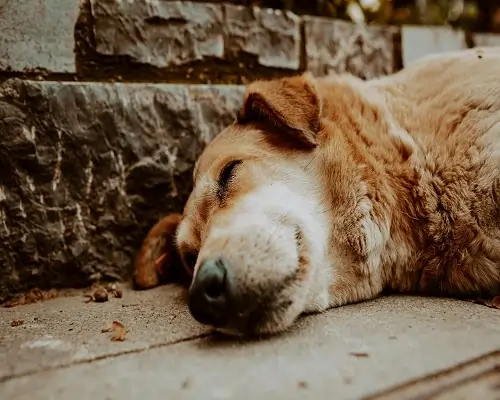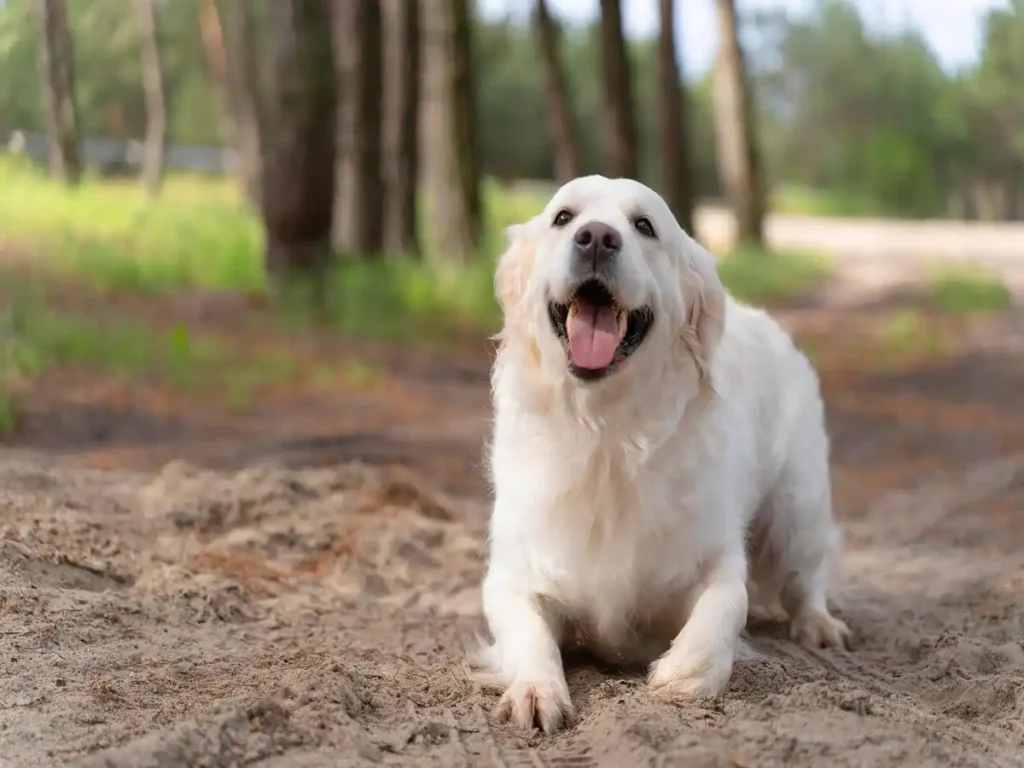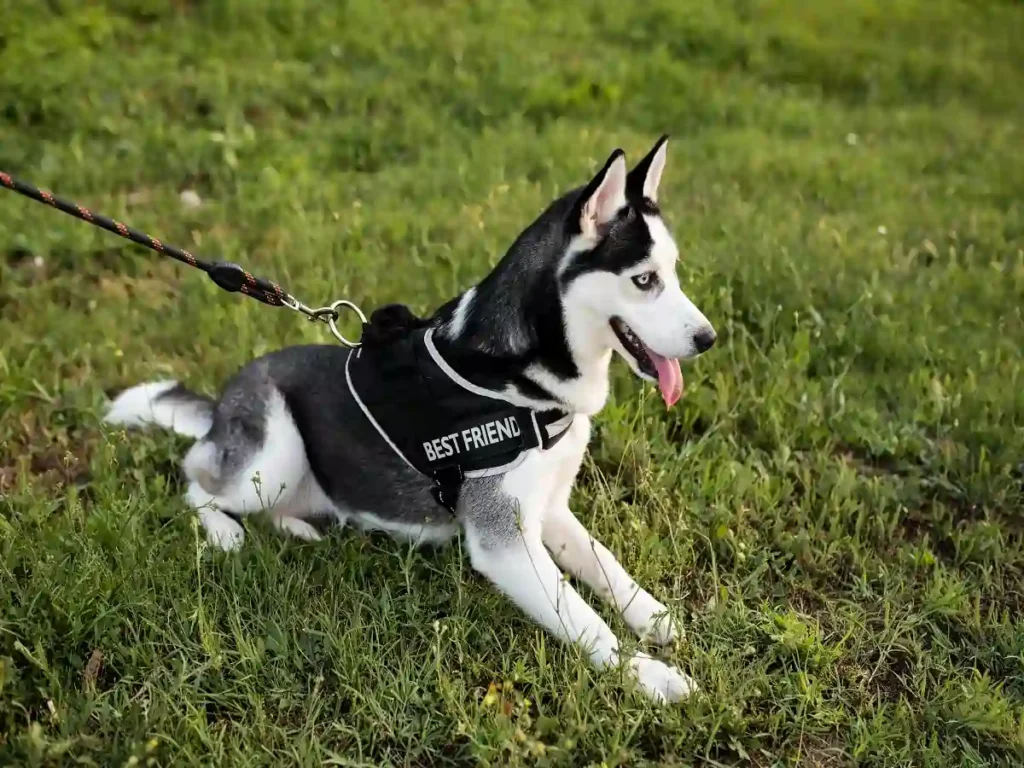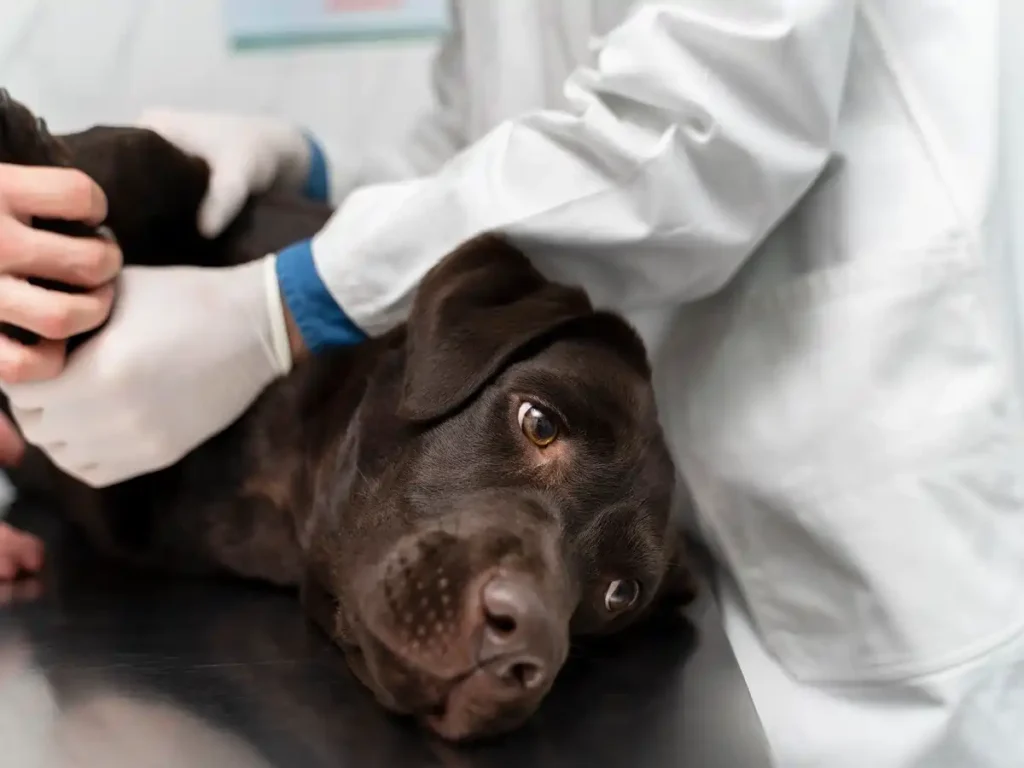Have you ever noticed your dog acting strangely and wondered why? Many pet owners feel confused when their furry friends start behaving oddly. It would be nice if dogs could tell us when they are not feeling well, like humans and we could just ask them or take them to the doctor. But dogs can’t talk, so we have to watch how they act and what they do. Sometimes, dogs do strange things that make us wonder if something’s wrong. If you have noticed your dog acting weird lately, it is important to pay attention and see if there is a problem.
In this blog post, we’ll talk about why dogs act weird. From small signs of discomfort to playful quirks and everything in between, we will figure out what might be causing your dog’s strange behaviour and give you tips to handle it.
So, If you are ready to explore the world of dog behaviour, let’s dive in and find out why your dog does those mysterious things.
Table of Contents
Toggle8 Reasons of “Your Dog Acting Weirdly”
Your dog might act strange sometimes, but it is not always a bad thing. It could just be because they are happy or feeling energetic. We will talk about some common weird things dogs do that might not be a big deal, but it is important to keep an eye on them and talk to a vet if you are worried. You will understand your dog’s behaviour better and know how to make things right at home. Whether you are new to having a dog or have been a pet parent for a while, knowing why your dog acts weird is important for having a happy relationship.
Here are some weird dog behaviour reasons to look out for:
- Situations of Happiness
- A Random Burst of Energy
- Health Issues
- Boredom
- Fear or Trauma
- Environmental Changes
- Attention-Seeking Behaviour
- Old Age
Situations of Happiness
Yes, situations of happiness can sometimes cause dogs to exhibit behaviours that might seem unusual or “weird” to their owners. When dogs experience intense joy or excitement, they may express it through a range of behaviours that can appear strange or unexpected.
When dogs are super happy, they can act a bit strange sometimes. Here are some examples:
- Rolling Around: Dogs might roll on their backs or sides when they are feeling joyful. It is their way of showing they are happy and having fun.
- Making Funny Noises: Happy dogs might bark, growl, or make other playful sounds to show they are excited and having a good time.
- Silly Behaviour: Dogs may do silly things like spinning in circles, jumping, or making big movements with their bodies when they are feeling happy and playful.
- Wanting Attention: Happy dogs might try to get attention from their owners by nudging them, pawing at them, or licking them. They just want to share their happiness with their humans.
- Playful Roughness: Sometimes, happy dogs play a little rough with toys or objects, like tearing them apart or shaking them around. It is just their way of having fun and enjoying themselves.
A Random Burst of Energy
A random burst of energy in dogs, often referred to as the “zoomies” or a “frenetic burst,” can indeed lead to behaviours that may seem strange or unusual to their owners. These bursts of energy are typically characterised by sudden, intense bursts of running, jumping, spinning, and general hyperactivity. While this behaviour may appear odd or erratic, it is actually quite common and is usually nothing to worry about. Here is how a random burst of energy could cause a dog to act weird:
Excess Energy Release: When dogs suddenly get super energetic, it is because they have a lot of energy stored up. They might have been sleeping or feeling lazy, and then bam. They just burst with energy.
Natural Instincts: Dogs have natural instincts from their wild ancestors. They might feel the urge to chase something, even if there’s nothing there to chase.
Environmental Stimuli: Sometimes, things around them trigger this burst of energy. Like hearing other dogs bark or seeing a squirrel outside. It’s like when you suddenly feel excited because something cool happens.
Playfulness: Dogs are playful creatures. They might just be having fun and running around like crazy. It’s their way of being happy and entertained.
Emotional Release: Just like us, dogs have feelings too. Sometimes, they feel really excited or even a bit stressed. Running around helps them release those feelings and feel better.
Lack of Outlet: When dogs have a lot of energy bottled up because they haven’t been exercised or played with enough, they might suddenly burst with energy. It’s like they’re trying to let out all that extra energy they have stored up from not being active.
Social Interaction: Dogs love being around others, whether it’s other dogs or people. When they’re with others, they can get really excited and full of energy. They might start playing around or trying to interact with everyone.
What To Do:
If your dog is acting weird due to a random burst of energy, there are several steps you can take to help manage their behaviour and ensure their safety:
Stay Calm: When your dog suddenly gets super energetic, it’s important to stay calm. Don’t panic or get upset because that could make things worse.
Ensure Safety: Make sure the area around your dog is safe. Remove any stuff they could bump into or break while they’re zooming around.
Redirect Attention: Give your dog something fun to do, like playing with toys or solving puzzles. This helps them use up their energy in a good way.
Engage in Play: Play with your dog when they’re all hyped up. Use toys like balls or ropes to play games and help them burn off energy.
Provide Exercise Opportunities: Make sure your dog gets regular exercise every day. Going for walks or playing in the yard helps keep their energy levels in check.
Establish Routine: Stick to a routine for feeding, exercise, and rest. Dogs like knowing what to expect, and it helps them stay calm.
Practice Obedience Training: Teach your dog basic commands like “sit” or “stay.” This can help distract them when they’re feeling extra energetic.
Provide Mental Stimulation: Keep your dog’s brain busy with training or games. It tires them out mentally, which can help calm them down.
Consider Calming Techniques: If your dog is still too hyper, try things like gentle massages or calming music to help them relax.
Consult a Professional: If your dog’s behaviour does not improve, consider talking to a professional dog trainer or behaviourist for advice.
Following these tips can help you manage your dog’s energy bursts and keep them happy and healthy.
Health Issues
When dogs aren’t feeling well, it can change how they act. For example, if they’re hurting from an injury or arthritis, they might limp or whine. Upset stomachs can make them not want to eat, or they might throw up or have diarrhoea. Breathing problems can make them pant or wheeze, and they might have trouble walking straight if they have nerve issues. Skin problems can make them scratch or lick a lot. Changes in how they pee or poop, or if they seem anxious or mean, can also mean something’s wrong. It’s important for you as a dog owner to watch for these signs and take the pet to the vet if anything seems off.Top of Form
When a dog isn’t feeling well, it can act strangely. Here’s how health issues could lead to a dog acting weird:
- Pain or discomfort: If a dog is hurting from an injury or arthritis, it might limp, whine, or breathe heavily.
- Changes in appetite: Upset stomachs or dental issues can make dogs lose interest in food or eat too much.
- Feeling tired: Sick dogs might seem tired or not interested in playing like they used to.
- Stomach troubles: Vomiting or diarrhoea can show that something’s wrong with a dog’s stomach.
- Trouble breathing: Coughing or wheezing can mean a dog is having trouble breathing.
- Nerve problems: Dogs might have trouble walking straight if they have nerve issues.
- Changes in Urination or Defecation: Problems with peeing or pooping can show that something’s wrong inside.
- Skin issues: Itchy skin or losing hair can make dogs scratch or lick themselves a lot.
- Behavioural Changes: Health issues can make dogs act scared, mean, or sad.
- Forgetfulness: Older dogs might seem confused or wander around aimlessly because of health problems like Alzheimer’s.
What To Do:
If a dog is acting weird due to health issues, it is crucial to take action to address their needs and ensure their well-being. Here are steps to follow:
Observe Carefully: Watch your dog closely for any strange behaviour or changes in their routine. Take notes to help the vet understand what’s going on.
Contact Your Veterinarian: Call your vet right away if you notice anything wrong with your dog. Describe what’s happening and give them any important details about your dog’s health and recent activities.
Follow Veterinary Advice: Listen to your vet’s advice and follow their instructions carefully. This might include giving your dog medicine, changing their diet, or scheduling follow-up appointments.
Provide Comfort and Support: Give your dog lots of love and comfort while they’re not feeling well. Make sure they have a quiet, cosy place to rest and try to keep them calm.
Monitor Progress: Keep an eye on your dog’s progress and let your vet know if anything improves or gets worse.
Maintain Care and Hygiene: Take good care of your dog by feeding them well, giving them water, and following the vet’s recommendations for exercise and grooming.
Manage Pain and Discomfort: If your dog is in pain, talk to your vet about ways to help them feel better. This might mean giving them pain medicine or making changes to their environment.
Follow-Up Care: Go to all the follow-up appointments your vet recommends to make sure your dog is getting better. Don’t hesitate to ask questions if you’re worried about your dog’s health.
Seek Emergency Care if Needed: If your dog suddenly gets really sick or has serious symptoms like trouble breathing or seizures, take them to the vet right away.
Important Recommendation: If your dog is sick, it’s important to act fast to help them feel better. Make sure to keep them safe and reach out to the vet for help and advice. Your dog’s health and happiness should always come first.
Boredom
Boredom in dogs refers to a state of mental and physical under-stimulation, where a dog lacks engaging activities or opportunities for mental stimulation and physical exercise. When dogs get bored, it means they’re not getting enough fun or exercise. Just like people, dogs need to play and stay busy to be happy and healthy. When dogs are bored, they might do strange things to try to entertain themselves. Let’s see how boredom can make a dog act weird:
- Chewing Stuff: Dogs might chew on things like furniture or household items when they’re bored. It helps them release energy and frustration.
- Barking Too Much: Boredom can make dogs bark, whine, or howl more than usual. They’re trying to get attention or show they’re not happy.
- Restless and Pacing: Bored dogs might wander around a lot, unable to sit still. They seem anxious and can’t settle down.
- Attention-Seeking: Dogs might bug their owners for attention when they’re bored. They may paw at them or do annoying things to get noticed.
- Trying to Escape: Boredom can make dogs want to run away for excitement. They might try to escape the yard or leave home to find adventure.
- Obsessive Behaviours: Some bored dogs develop habits like excessive licking or chasing shadows. It’s a way to distract themselves, but it can become a habit.
- Hyperactivity: Dogs might suddenly get super hyper and start running and jumping all over the place. It’s like they’re trying to burn off energy from being bored.
- Demanding Attention: Bored dogs might do things like jumping on furniture or stealing things to get their owner’s attention.
- Sleep Troubles: Boredom can mess up a dog’s sleep, making it hard for them to sleep at night or causing them to nap a lot during the day.
- Feeling Down: If a dog is bored for a long time, they might start acting sad or uninterested in things they used to enjoy. It’s like they’re feeling depressed.
Important Recommendation: Dog owners should watch out for signs of boredom in their pets and take action to keep them happy. Regular playtime, interactive toys, obedience training, and lots of exercise can help fight boredom and make your dog feel good.
What To Do:
Boredom in dogs occurs when they lack mental and physical stimulation, leading to restlessness, frustration, and a variety of strange behaviours. Dogs are naturally active and intelligent animals, so when they don’t have enough opportunities to engage their minds and bodies, they may resort to behaviours that seem unusual or even disruptive. Signs of boredom in dogs can include excessive barking, chewing, digging, pacing, or seeking attention in inappropriate ways.
Boredom can lead to unusual behaviour in dogs because they seek ways to alleviate their boredom and entertain themselves. For example, a bored dog may start chewing on furniture, digging up the yard, or barking excessively as a way to release pent-up energy and stimulate themselves mentally. They may also seek attention from their owners by engaging in attention-seeking behaviours, such as nudging, whining, or pawing.
To address boredom-related behaviours in dogs, it’s essential to provide them with adequate mental and physical stimulation to keep them engaged and fulfilled. Here’s what you can do:
Provide Regular Exercise: Make sure your dog gets enough exercise every day. Take them for walks or play fetch to keep them active and happy.
Enrich Their Environment: Give them toys and games that make them think. Change their toys often to keep them interested and prevent boredom.
Training and Obedience Work: Train your dog to learn new things. It’s fun for them and helps you bond with your pet.
Socialisation: Let your dog meet other dogs to play. It’s good for their social skills and keeps them from getting lonely.
Engage in Interactive Play: Play with your dog using toys like ropes or balls. It’s a great way to spend time together and keep them entertained.
Provide Mental Challenges: Teach your dog new tricks or play games to keep their mind sharp and busy.
Rotate Toys and Activities: Change up their toys and activities so they don’t get bored. Introduce new things to keep them excited.
Supervise and Redirect: Keep an eye on your dog and stop them if they start doing something bad. Give them something else to do instead.
Consider Doggy Daycare or Dog Walker: If you’re away a lot, consider sending your dog to daycare or hiring someone to walk them. It gives them company and keeps them busy.
By doing these things, you can keep your dog from getting bored and doing weird stuff. It helps them stay happy and healthy.
Fear or Trauma
When a dog feels scared or goes through a bad experience, it can affect how they act. They might start doing things that seem strange because they’re feeling anxious or stressed.
When dogs feel scared or go through bad experiences, they might act in strange ways. Here’s how fear or trauma could make a dog act weird:
- Avoiding Things: Dogs might try to hide or run away from things that scare them, like places, people, or objects linked to a bad experience.
- Getting Aggressive: If they feel trapped or threatened, they might growl, bark, or try to bite to protect themselves.
- Breaking Things: Dogs might chew, scratch, or dig to calm themselves down when they’re anxious or scared.
- Making Lots of Noise: Scared dogs may bark, whine, or howl a lot to show they’re upset or worried.
- Panting and Moving Around: They might breathe heavily and walk back and forth if they’re anxious or scared.
- Shaking or Trembling: Fear can make dogs shake or tremble because they’re so upset.
- Being Submissive: Some dogs act submissive by cowering or lying down to avoid trouble.
- Being Extra Alert: Scared dogs are always looking around for danger and might get scared easily.
- Not Eating: When dogs are scared, they might lose their appetite and not want to eat.
- Peeing or Pooping Inside: Fear can mess up a dog’s bathroom habits, making them have accidents inside.
Important Recommendation: If your dog shows these signs, it’s important to help them feel better and safe. You can do this by being patient, giving them love and support, and maybe getting help from a dog trainer or behaviour expert.
What To Do:
If your dog is acting strange because they’re scared or upset, it’s important to help them feel better. Here’s what you can do:
- Stay Calm: Stay calm yourself to help your dog feel safe and relaxed. Don’t get frustrated or angry, as it can make things worse.
- Find Triggers: Figure out what’s scaring your dog. It could be certain sounds, objects, people, or situations. Knowing this helps you handle their fears better.
- Make a Safe Spot: Set up a cozy spot where your dog can go when they’re scared. It could be a quiet room with their bed, toys, and water.
- Take it Slow: Don’t force your dog to face their fears. Instead, gently expose them to what scares them over time, using treats and praise to help them feel better.
- Reward Good Behaviour: When your dog stays calm, give them treats or toys to show they’re doing well. This helps them feel positive about things that used to scare them.
- Distract Them: Give your dog fun toys or play games to take their mind off their fears and focus on something fun.
- Teach Relaxation: Help your dog relax with gentle massages or breathing exercises. This can calm their nerves and make them feel better.
- Get Professional Help: If your dog’s fear is serious, consider getting help from a vet or dog trainer who specialises in fearful dogs. They can give you personalised advice.
- Consider Medication: In some cases, your vet might recommend medication to help your dog feel calmer. Always talk to your vet before giving your dog any medicine.
- Be Patient: Overcoming fear takes time, so be patient with your dog. Celebrate their progress and keep supporting them.
By being patient and understanding, you can help your dog feel safer and happier, improving their overall well-being.
Environmental Changes
Environmental changes can significantly impact a dog’s behaviour, often leading to strange or unusual actions. Dogs like routine, so when things change, they feel less safe and secure.
When things change around your dog, it can make them act strange. Here’s why:
- Stress and Anxiety: Dogs get stressed when things change suddenly, like moving or new family members.
- Feeling Lost: Dogs like routine, so when their environment changes, they can feel confused and unsure.
- Unpredictable Environment: Dogs like knowing what’s going to happen. When they don’t, they might pace around or look for comfort.
- Too Much Sensory Stuff: New sights, sounds, and smells can be overwhelming for dogs, making them nervous.
- Protecting Their Space: Dogs are territorial. When things change, they might act protective or aggressive.
- Routine Upset: Dogs like a schedule. Changes to their routine can stress them out and change their behaviour.
- Family Changes: Adding or losing family members can change how dogs act around the house.
- Fear of New Things: Dogs might be scared of new places or things until they get used to them.
- Feeling Unsafe: Changes can make dogs feel exposed and scared, so they might act more alert or defensive.
- Seeking Comfort: Sometimes, dogs will look for familiar things, like their bed or toys, to feel safe again.
Overall, changes can be tough for dogs, but with patience and care, they can adjust and feel better.
What To Do:
If your dog is acting weird due to environmental changes, it’s essential to provide them with support and guidance to help them adjust to their new surroundings. Here are steps you can take to help your dog cope with environmental changes:
- Stick to a regular routine for your dog.
- Create a safe space where they can relax.
- Introduce them to changes gradually.
- Reward them when they’re calm.
- Surround them with familiar things.
- Offer toys and playtime to keep them busy.
- Comfort them with gentle gestures.
- Get help from a professional if needed.
- Stay positive and supportive throughout the process.
Attention-Seeking Behaviour
Attention-seeking behaviour in dogs can lead to unusual or “weird” actions as they try to garner the attention they desire from their owners. Dogs are social animals that thrive on interaction and companionship, and they may resort to various behaviours to seek attention when they feel lonely, bored, or neglected. Here’s how attention-seeking behaviour could cause a dog to act weird:
Excessive Vocalisation: When dogs want attention, they might bark, whine, or howl a lot. This could be because they feel lonely when left alone, or they want food or playtime.
Jumping and Pawing: Dogs might jump up on people or paw at them over and over to get love and attention. This can be annoying and might get worse if not stopped.
Nudging or Pushing: Some dogs might nudge or push their owners with their nose or body to get attention. They might also whine or paw at them. This can happen a lot if the dog feels ignored.
Destructive Behaviour: Dogs might chew on things, dig, or tear up stuff in the house to get their owner’s attention. This might be because they’re bored, frustrated, or need help.
Attention-Grabbing Tricks: Sometimes, dogs do funny or silly things like stealing things, running around in circles, or rolling on the floor to get their owner’s attention and play with them.
Why Dog’s Want Attention-Seeking Behaviour
Dogs are social creatures. They like being around people and want to connect with their human family. When they do things to get attention, it helps them feel closer to their owners and like they belong.
Communication: When dogs want something, they use actions to tell us. They might nudge us, paw at us, or make noises like barking to let us know they want to play, they’re hungry, or they need comfort.
Physical and Mental Stimulation: Playing with dogs and spending time with them keeps them happy and healthy. It’s like giving their bodies and minds a good workout. This helps them stay sharp and strong.
Emotional Support: Sometimes, dogs need extra love and care, especially when they’re feeling anxious or alone. Getting attention from their owners helps them feel safe and secure, reducing their stress.
Bonding: When we give our dogs love and attention, it builds a strong bond between us. They learn to trust us, and we become their best buddies. It’s all about showing them how much we care.
Behavioural Development: Playing and spending time with dogs helps them learn how to behave well and get along with others. It’s like teaching them the rules of being a good dog in our world.
Enrichment and Enjoyment: Having fun with our dogs isn’t just good for them; it’s good for us too! It brings joy and happiness to both parties and makes life more exciting.
Physical Health: Taking dogs for walks and playing games with them keeps them healthy and fit. It’s like going to the gym for them, helping them stay in shape and full of energy.
What To Do:
If your dog is acting strange because they want attention, it’s important to figure out why and how to deal with it. Here’s what you can do:
- Figure out what sets off your dog: Pay attention to what makes your dog act this way. It could be because they’re bored, not getting enough exercise, feeling anxious when left alone, or just wanting your company.
- Make sure your dog gets enough exercise: Take your dog for walks, play games, and give them toys to keep them busy and happy.
- Stick to a routine: Dogs like having a schedule. Feed them, play with them, and train them at the same times every day.
- Ignore bad behaviour: If your dog does something you don’t like to get attention, don’t give them any until they calm down.
- Reward good behaviour: When your dog behaves well, give them praise, attention, and treats to show them they’re doing a good job.
- Give them fun things to do: Keep your dog entertained with toys, games, and activities that challenge their brain and keep them busy.
- Teach them better ways to get attention: Train your dog to do things like sitting or giving you their paw instead of bothering you for attention.
- Set rules: Make it clear what behaviour is okay and what’s not, and stick to it.
- Get help if you need it: If your dog’s behaviour is really causing problems, ask a professional for advice.
- Be patient and keep trying: It might take a while, but with time and effort, you can help your dog learn better ways to get attention and make your bond even stronger.
Old Age
As dogs get older, they might start acting differently. This can seem strange, but it’s because they’re going through changes in their body and mind. Some common changes include:
- Moving around more or less.
- Being less active.
- Sleeping differently.
- Feeling confused or lost.
- Acting differently with people and things around them.
Older dogs might also feel pain because of things like arthritis or dental problems. This can make them act in ways that seem odd, like wandering around or making more noise.
Important Recommendation: It’s important for owners to understand these changes and give their older dogs the care and support they need. This includes making sure they’re comfortable and getting the right medical help when needed.
Final Words
In conclusion, understanding your dog’s behaviour means knowing what might be causing it—whether it’s health issues, changes in their surroundings, wanting attention, or just being happy. By realising that odd behaviour can signal both problems and happiness, you can respond well to your furry friend’s needs. Being patient, watching closely, and asking for help when needed, you can keep your dog healthy and happy. Your bond with your dog grows stronger as you support them through their quirks and happy moments, building a relationship based on trust and love.














